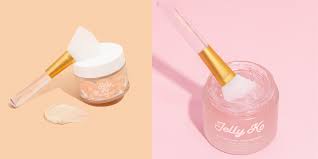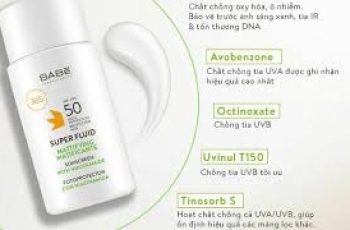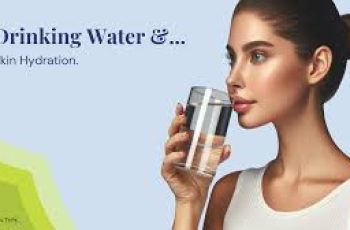Overnight Face Mask Vs Night Cream: What’s the Difference and Which One to Use?
There’s no denying the fact we are spoilt for choice when it comes to skincare products. This usually results in you finding a routine that suits you and your skin type. Things can get a little tricky when it comes to figuring out what exactly is the difference between products that sound basically the same. No need to panic, we are going to get to the bottom of this and find out what are overnight face masks and night cream, what is the difference between them and which one is best to use?
What is an overnight mask?
Overnight masks are formulated around the same idea as regular face masks, the main difference being you wear them overnight, as you probably guessed. Packed full of active ingredients that will help transform your skin and address any concerns you may have such as, ageing, dullness and combating breakouts. You will also find that overnight masks come in a lightweight or gel like formulation making them quite compatible to almost all skin types. Also known to go by the name of sleeping masks, overnight masks are highly effective at treating the skin whilst you catch up on some shut eye. This also allows the potent blend of skin ingredients to absorb into the skin, penetrating the lower layers without having to battle against the environmental aggressors our skin comes into contact on a daily basis, such as free radicals, pollution and UV damage.
Many skincare experts believe that overnight masks containing ingredients, such as hyaluronic acid, lactic acid, retinol or niacinamide have the most optimal time to work on the skin whilst we sleep. This is due to the fact that when we sleep our skin is able to reset and repair any damage caused from the day giving the product more potential to be most effective allowing you to really notice a difference by the morning.
Can I use an overnight mask every night?
This is really dependant on which active ingredients are in the overnight mask, for example, exposure to a chemical exfoliant on a regular basis can lead to the skin becoming UV sensitive meaning it can become irritated and red. When using overnight masks it should be considered more of a treatment product rather than an essential step in your evening skincare routine. This will stop the overuse of a sleep mask that can lead to skin reactions and tightness.
What is a night cream?
The formulas of night creams are typically thicker and creamy compared to overnight face masks and are able to soak into the skin throughout the night. These creams are not as potent as overnight masks allowing you to use them as part of your everyday skincare routine. Overnight masks regularly contain ingredients that are not recommended to be used during the day, such as retinol, making them fully effective at penetrating into the skin leaving you with noticeable difference in the overall look and feel of your complexion.
What is the best time to apply a night cream?
It is tricky to estimate the perfect time to apply your night cream, especially as so many of us hit the hay in various hours throughout the night. It is recommended to apply your night cream just before you go to bed which should ideally be around 10-11pm. Here is an example of a good evening skincare routine that will benefit your night cream and allow it to work more effectively;
Remove all traces of makeup with makeup remover or micellar water
Cleanse the skin with an none foaming cleanser to remove any remaining traces of product and debris
Swipe an acid toner-soaked cotton disc around your face, avoiding the eye area, removing any build-up of dead skin cells
Apply your serum of choice by patting it into the skin
Finally apply your night cream, your skin should feel tacky to touch as you head off to bed
Do I really need a night cream and overnight mask?
There is not really any need to use both in your routine, however it is a great idea to keep a couple of products on rotation to keep your skin looking and feeling its healthiest. If you are finding you have a number of concerns such as dullness, uneven skin tone and signs of ageing, such as fine line and wrinkles then using a night cream regularly will help target any of these concerns and help diminish any sing of them over a time of 6-8 weeks. When using an overnight mask, you can pick and choose when you apply them making them a more potent treatment product. Ideal for applying when you feel as though your skin is in need of something, such as an extra boost of hydration and brightening.
Should I use an overnight mask or night cream?
This really comes down to your own personal preferences, if you are noticing some signs of ageing or other concerns to the skin that can be helped with a daily night cream than this would be the best fit for you. Remembering to take into consideration which skin type you have, for example, oily skin would not appreciate a thick, heavy cream that can result in congested pores and flare-up in spots and blackheads.
Whichever product you will decide to use you’ll see a difference in the appearance of wrinkles, tighter skin and a complexion that looks vibrant with greater clarity.
Is there really a difference between day and night cream?
As you will know by now there is indeed a number of differences between an overnight face mask and night cream, the main concerning how often you are able to use them, here is a quick recap on the differences and how to use each product;
Benefits of overnight face mask
Formula is highly potent with active ingredients
Consistency is usually gel or light-weight cream
Can help with concerns such as dehydration, breakouts and skin ageing
Formula is too powerful to use every night and should be used as an occasional skin treatment
Best applied before you head to sleep to allow plenty of time for the product to penetrate the skin
Benefits of night cream
Formula isn’t as strong as a face mask so can be used every night
Usually has a thicker and creamy texture
Highly nourishing to the skin
Treats signs of ageing, such as fine lines and wrinkles
Best applied as the final step in your evening routine before bed
Today’s post would have hopefully by now answered a number of your questions about an overnight face mask and night cream, both products are highly effective at treating the skin and diminishing any signs of age, uneven skin tone and lose of firmness. With formulations packed with active ingredients that pack a punch and work tirelessly whilst you get some well-earned beauty sleep. Don’t forget you can check our dedicated blog post about the full skin benefits of using an overnight face mask.
DQH Knowledge drop: In your 20s, your skin cell turnover decreases. (Cell turnover is a key component in keeping your skin youthful.) You know what else slows down? Your collagen production. Starting in your 20s, collagen decreases by about 1 percent per year. Should you want to prevent fine lines and wrinkles, start by eliminating behaviors that contribute to premature aging. “If it’s bad for you, it’s bad for your skin,” says dermatologist Michel Somenek.
“Cigarette smoking reduces blood flow to the skin and causes premature wrinkling and a dull skin texture. Making the repeated pursed motion to inhale can also cause smoker’s lines. Alcohol and recreational drugs are toxins for the skin that damage its cellular structure and DNA,” Somenek tells us. “The faster you eliminate vices while you are young, the better chance your skin and body have to recuperate.” Also, adopting an anti-aging routine in your 20s is key. After all, the best offense is a good defense. We spoke to Somenek and experts Joshua Ross and Audrey Kunin to find out more.
Keep reading for the best anti-aging products for your 20s, according to skincare professionals.
Sunscreen
“We all know that the sun is the number one cause of skin aging and starting the prevention in your 20s is very important,” Ross says. “The majority of your sun damage won’t start to appear until you’re in your 30s, so don’t wait until you see it surface or you’ll be behind the curve. Stay ahead of it with a good-quality zinc-based sunscreen worn daily.”
Farmacy Green Defense Daily Mineral Sunscreen
An invisible sunscreen with SPF 30, plus botanical extracts meant to protect skin with tons of antioxidants. Bonus: It’s clean and fine to use under makeup.
Bareminerals Complexion Rescue™ Tinted Moisturizer Broad Spectrum SPF 30
Although we recommend you use your SPF and moisturizer separately, we also understand moments when you don’t have time or energy for that extra step. For those times, this bareMinerals moisturizer is a great thing to have on hand.
Vitamin C Serum
“A great introduction to anti-aging is to start with a vitamin C serum in your morning skincare routine,” Ross says. “It’s a powerful antioxidant that will neutralize free radicals and brighten the skin.” He adds that it’s a great way to counteract the effects of the sun’s harmful rays, which, as previously mentioned, are among the biggest causes of premature aging.
Drunk Elephant C-Firma™ Vitamin C Day Serum
The Drunk Elephant C-Firma is a lightweight serum that promises to give skin a glow by combining the brightening powers of vitamin C with ferulic acid, l-ascorbic acid, and vitamin E. The included sodium hyaluronate is meant to replace hydration loss, so you shouldn’t have to deal with any irritation.
Sunday Riley C.E.O. Rapid Flash Brightening Serum
This potent serum is jam-packed with vitamin C (15 percent, to be exact), which means it’s a potential superstar at both brightening skin and dousing it in antioxidants.
Peptides
Using peptides on your skin has many benefits, says Somenek. “The skin barrier is what defends the body against pollution, UV rays, bacteria, and toxins. It can be damaged by several everyday factors. Using topical peptides aids in building a stronger barrier,” he says. “Peptides comprise elastic fibers, which are a type of protein. These fibers help to make skin appear taut and firm. Peptides can also help repair damaged skin, relieve inflammation, and even out skin tone. Some peptides can kill acne-causing bacteria that is common in 20-somethings.”
Kunin agrees, saying, “Peptides are an excellent entry point for supporting collagen.” She recommends looking for face and eye treatments that contain these collagen-boosting powerhouses.
Charlotte Tilbury Magic Eye Rescue Cream
This Charlotte Tilbury super-emollient eye cream has a base of coconut oil and shea butter (read: it’s incredibly hydrating). Botanicals plus peptides are meant to help reduce dark circles and boost collagen, respectively.
This creamy moisturizer serves up potent collagen-boosting peptides and pycnogenol, and antioxidant-rich vitamin C. “Instead of sitting on top of the skin, peptides penetrate the outer layer so they go deep. The ‘signals’ they send tell the cells to produce elastin and collagen, which are needed for youthful-looking skin,” explains Somenek.
At-Home Peel Pads
Remember that skin cell turnover fiasco we talked about earlier? One way to help support it is by exfoliating. “Exfoliation is important to help keep skin fresh and luminous,” Kunin says. She recommends using at-home peel pads as an easy and effective way to exfoliate.
“The goal in your 20s is to fight the slowing pace of cell turnover. It is wise to use products that gently exfoliate, yet still remove oil and other impurities. Products that have Alpha Hydroxy Acids (AHA) or Beta Hydroxy Acids (BHA) are a good choice.”
According to Somenek, you should only exfoliate two to three times a week. “People of all ages are guilty of over-exfoliating and that can be too much of a good thing,” he says.
Dermadoctor Kakadu C Intensive Vitamin C Peel Pad
A few swipes of this Derma Doctor powerful peel pad promise to leave your skin glowing and smooth, thanks to the seven (yes, seven) types of chemical exfoliants, including AHA and BHA. It also contains vitamin C via Kakadu plum extract for added brightening and antioxidant protection.
KEY INGREDIENTS Kakadu plum extract is sourced from the Kakadu plum, a fruit grown in northern Australia. It contains vitamin C, which restores the skin’s natural barrier, increases collagen production, and soothes irritation.
Dr. Dennis Gross Skincare Alpha Beta® Universal Daily Peel Pads
These are the gold standard of peel pads, with a cult following and over 900 five-star reviews on Sephora. They’re easy to use and contain a blend of anti-aging exfoliating acids.
Emollient Night Cream
“In your 20s, you need to start upping the hydration in your skincare routine. You may have been cautious of over-moisturizing because of acne in your teens, but as you enter your 20s, your skin transitions and becomes drier,” Ross says. “I recommend an emollient night cream added into your evening skincare regimen.”
“Twenty-somethings need to make sure that they are not using creams that will clog their pores and cause excess oil production,” says Somenek. Opt for non-comedogenic products.
Cerave Skin Renewing Night Cream
One great choice is the CeraVe Skin Renewing Night Cream, which is a non-comedogenic night cream that leaves skin soft and glowy. It combines the moisturizing powers of ceramides and hyaluronic acid.
RoC Retinol Correxion Max Hydration Creme
“The best night cream ingredients contain retinol, benzoyl peroxide, and/or salicylic acid or hyaluronic acid. The goal is to moisturize, yet remove excess oil,” says Somenek. This Roc Retinol Correxion cream fits the bill as it contains both hyaluronic acid and retinol so it promises to moisturize while also being non-comedogenic.



